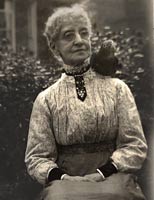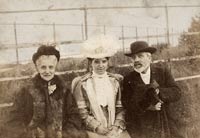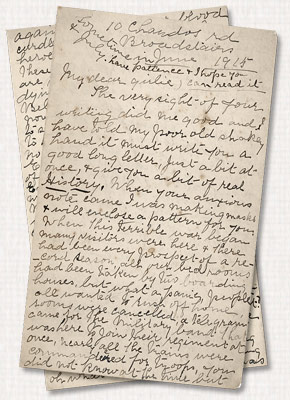1915 Letter from Mrs. Bradbury, in Broadstairs, Kent, to Mrs. Elizabeth Jane Goodyear (nee Rydings) in Failsworth, Lancashire.
| Mrs Hannah Bradbury Richard & Hannah Bradbury |
|
Letter from Broadstairs 1915 |
|
My dear girlie, The very sight of your writing did me good and I have told my poor old shaky hand it must write you a good long letter, just a bit at once and give you a bit of real History. Batttleships and destroyers were on either side of us. Fifty big battleships sailed gloriously past like so many guardian angels which they really were all together. Then another lot of nineteen with a mighty dreadnought in front, looking for all the world as if they were playing follow your leader. And they have been playing at business ever since. Then they brought us a lot of soldiers; then more, besides sea-scouts and land scouts. Then the wounded began to arrive. Richard saw the first hospital ship land with the wounded and refugees. One woman told him it would have been bad for those in France if our men had not gone so quickly, and, she said, whatever you hear about the Germans that is vile you may believe it however bad it is. All our wounded tell us the same. Had they tried for Calais first they might have landed, we were so unprepared. Fortunately, for us they made a grand mistake. A naval man told Richard, whilst it was not generally known, that but for a splendid ruse on the part of Winston Churchill, with regard to our ships, they would have invaded by barges at the North Sea end. They had a big army ready, at Cuxhaven I think, but the ruse succeeded, so they were foiled and we were saved. We chatted with five of the wounded Argyls who were in that first awful all night Lancer charge. They were in their shirt sleeves, no cats or hats on, sleeves rolled up, on they dashed, right through the line, back, then through again. It makes your blood curdle to talk with the heroes and look at their trophies, these mothers' darlings who are nobly doing and daring and dying that we may live. The Belgians are more philosophical now, but at first it was pitiful to see them, you felt like crying to hear them say, "No home now, no! No Belgium, but oh you English are so good to us." Some of them say they will take some English soil in a little Union Jack when they can go back to live in Belgium. We have a big lot of wounded here, so we can any time have a chat. They like to be spoken to, always they are so cheerful. Last August we had two gentlemen sleeping here when war was proclaimed who had to go sharp. One night we were all fast asleep when the doorbell was violently rung. I leapt out of bed and called out, "What is it?" A telegram for Cyril Hughes. He heard and rushed downstairs. It was from the War Office telling him he must go in the morning. Oh what a handsome lad he was. He looked the very essence of nobility as he stood there. The day before he had said to me, "Do not be afraid Mrs. Bradbury. We shall win, it will be a big task, but this is a jolly bit of water." I shall never forget how I felt as I looked at his beautiful manly face and wondered, will you come back again? His mother was upstairs heartbroken. The other boy too and his wife had come out. We stood ever so long, all of us in our nighties. These two boys had never seen each other before but it was lovely to see them shake hands and wish each other God speed on their way to fight for us and the honour of our England (Britain). The next day both had gone. It is dreadful that so many flowers of our manhood have been sacrificed because we were not prepared. Fortyfour years Germany has been working for our destruction and our sleepy heads would not heed the warning cry of Lord Roberts and others; even now it is, "Wait a bit and see," 'til we were nearly done for. We had orders some time ago that if need be we must be ready to leave our home at a few hours, or instant notice with enough food for two or three days, we to go by one route to Canterbury, the soldiers to come here by another route to take possession, to help the soldiers already here. Now we are told what to do in case of another raid. We have wet sand and pails of water on each landing, soda and water for incendiary bombs. We are never sure what will happen, when we go to bed, if we sleep at the top we may be helped to the bottom by a bomb, if we sleep at the bottom we may have the gas to face. We keep our masks wet ready to put on. One of the soldiers who has tasted their gas told Richard that one mouthful sends you to sleep and he said "We were one whole night blind in the trenches." And this is their boasted "Kuture". A little while ago we thought the vestibule was being blown down. Richard ran to see what there was, but no sign of anything. A little later he learnt it was a live mine close by in the sea, was fired on at once and the explosion gave us all a shaking. That was two in one week. A live one was washed up on to the beach at Margate. It was watched and a wire sent to Chatham. At once experts came down and took it to pieces. We have heard the booming of the guns across the water when the wind has been favourable. It is an awful sound when you feel what it means, death to beloved ones. For a long tiome Ramsgate has had each opening to the sea barricaded with barbed wire. It is a very important naval base. No-one is allowed inside the harbour or on the pier or near the lighthouse. Anyone trying is liable to be shot. Ships are not allowed to pass in or out between sunset and sunrise. Numbers of fishing boats, both of our own and Belgian are having to be kept idle 'til the end of the war. It was pitiful to see bits of clothing, mattresses etc. on the refugee boats. Just what they could get together quickly when they had to flee. Now the soldiers are putting sandbags and barbed wire all along Broadstairs front. We have armoured cars and we are told they are going to put big guns too, that means we are fortified so we may expect business of some sort. Some of the Royal Engineers are doing the work. We have a number of the 8th Irish Brigade (Liverpools). Among them are Lancashire boys, brim full of fun. We were chatting with one from Oldham. They seem to be from everywhere. July 8th ......... Early last Friday morning a zeppelin flew over the front here but did not do any mischief. All through Saturday night there was very heavy firing, on Ostend it is thought. The night of the raid it was awful. We were fast asleep. I was suddenly awakened by a terrific crash, it felt as if it were only a yard or two away. My heart seemed to be still for a moment then I heard the whir-r-r-r of a zeppelin just over our heads. I jumped up and ran to the window but could not see anything, but oh! CRASH, CRASH, BANG, BANG went bombs and guns and I knew the Huns were here. I could not tell you the feeling - I was not afraid - a still calm seemed to come over me as I stood watching and waiting and listening to them sending down death and destruction. At last I woke richard. He was so soundly asleep that he had not heard 'til I woke him, then he did hear somse of them. The night they went to London two of the zeppelins were over us again. We did have it hot for a while, guns were firing, rockets shooting up and flash lights going. We stood on the front and watched it all with a zep. standing still, right over the houses on the front. So you see we are rather busy with zep., mines and submarines. Several have been sunk quite near us, our airmen have not full liberty to do what they could, there is too much red tape and too many spies loose. We saw one great big German spy being taken away a few days ago, he had been cursing terribly and said we should all be blown up that night. We did not know he was a spy when we saw him marched away. There is a beautiful Dutch vessel anchored just out here, it had some Germans on a naval man told a friend of ours. One leapt overboard to escape but they shot him. Aeroplaes are scouting and seaplanes too, it is a lovely sight to see a seaplane dash like lightening through the water, then gracefully rise out of the waves, take a pretty curve and away they fly. We are only 45 miles from Calais and I am wondering how our boys will deal with the 1,000,000 murderers who are going to try again to reach this side of the water. We shall have to "wait and see". I wish I could be a fairy and at once all the shells needed to exterminate the savage horde of ruthless vandals only that I want the Kaiser to live and have time to think, and keep on thinking, in loneliness, of the awful crimes for which he is responsible. Saturday: Since my last letter Richard has kept very ill, all last year he was very, very ill; that dreadful blood poisoning keeps troubling him, yet he is not quite so bad just now and he will not have it that he is an old man, he still says he is only ten years old. We are so sorry to hear you are not well. Don't be poorly dear little girlie, you have eighty fingers and toes who want and need you to look after them, dear little rosy, saucy lips to kiss. Happy, happy mother. Please give them greetings and kisses from us and thank your little son for the tiny card, it was lovely, especially the 'cloud'. Are you nursing or is it that you are helping to make the garments for the poor wounded ones? Yes! I too have been busy and Richard does all he can for the soldiers free of charge. What we love to see in the soldiers is the real sweet modesty, they are like Bugler Dum, "they puts no bloomin' sides on." First we thought we would send some blankets, Not one could we get. A lady went in a motor to all the shops and bought up every blanket. Well that was all right, so we sent some body belts. Then I set to and made a lot of seaweed cards. They were sold for war funds for Xmas. We have beautiful acknowledgements from the War Office, Buckingham Palace, Lady Emmott, Baroness Orczy and others. All well I shall make more, they will sell. If I were near Mrs. Lees I would ask her to buy some. It is very cold here for the men in winter, on the top of the cliffs keeping watch. Some of the so-called mits sent by the Government are only bits of wristlets, no good for warmth, so I made a lot of right cosy ones out of winter socks, cut off just above the bad part of the heel. The boys say they are comfy. I shall try to make a cosy helmet as soon as I have a bit more time; it takes so long to knit them. My dear love to your mother. I dare say our doings will interest her. You will be sorry to know the sweet catholic girl who used to join us in our talks died in St. Mary's hospital last year - a tumour. I hope Flossie is still getting on well with her studies and your little lisping Lillie too. Your dear Frank, too, is it well with him? Tell him I say he is a blessed man to have all these treasures. Shouldn't we have had a busy time at Church Terrace among all this? We should have done a 'big bit' I know. I am keeping fairly well in health but getting an old woman now. We shall be very glad to have a letter from you when you feel you can spare the time. Do like me - a few lines at a time. Goodbye, dear one, for this book is full. |
|||


